Riverdale Netflix series writer offers unique mentorship
In collaboration with Ryerson’s Tri-Mentoring Program, The Creative School launched the first graduate student mentoring program (opens in new window) this year, with an incredible network of industry professionals ready to help students understand life after graduation. The program is designed to help students build their networks, gain industry insights, and take on new challenges as they work towards their career goals.

Mentorship Program online banner design
The RTA Media’s Master of Media Production’s first-ever graduate mentorship program partnered students with industry professionals to provide them with meaningful connections and on-the-job training for greater opportunities in future creative careers. One such pairing brought together Michael Grassi (external link, opens in new window) , the writer of the successful American teen drama television series Riverdale (external link, opens in new window) and showrunner for American musical comedy-drama Katy Keene, with MA student Emily Duncan. Grassi, currently based in Los Angeles, virtually mentored Duncan over an eight month period.
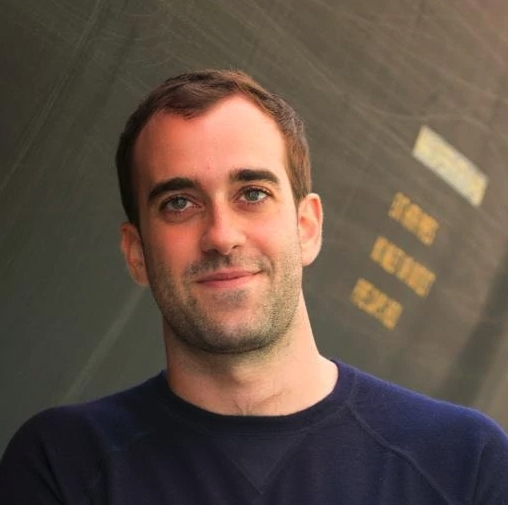
Portrait of Michael Grassi, graduate student mentor for The Creative School and writer for hit CW/Netflix series, Riverdale
Duncan completed her undergraduate degree in Media Production (RTA Media), and is currently completing her Masters of Media Production. She said that having the opportunity to connect with Grassi, a fellow RTA Media alumnus, was a dream come true. “I’m very interested in television writing and specifically teen dramas so to talk to Michael who is in the exact position I hope to be in one day and who graduated from the same program as I did was such an amazing opportunity,” says Duncan. “He was so helpful, he made himself very available to me and we spoke candidly about the industry and my personal goals. My time with him was great!”
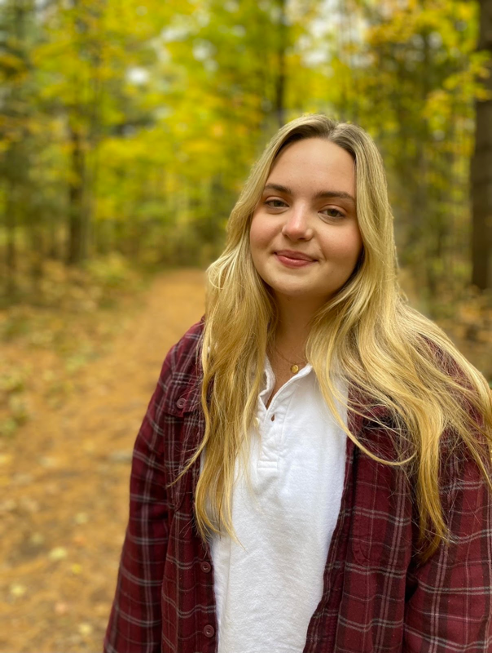
Emily Duncan, current Master of Media Production (RTA Media) student
Engaging alumni and industry professionals in a meaningful way
Director of Academic Planning and Student Affairs, Marie Crosta (opens in new window) , helped bring the program to life. “We know our alumni and wanted to reimagine ways to re-engage them. So often our alumni are called with requests for donations or ways to give back and I wanted to offer them an alternative way to do this by offering their time and insight” says Crosta. “We appreciate how valuable their time is, so having them give an hour or two per month has quite the impact on students.”
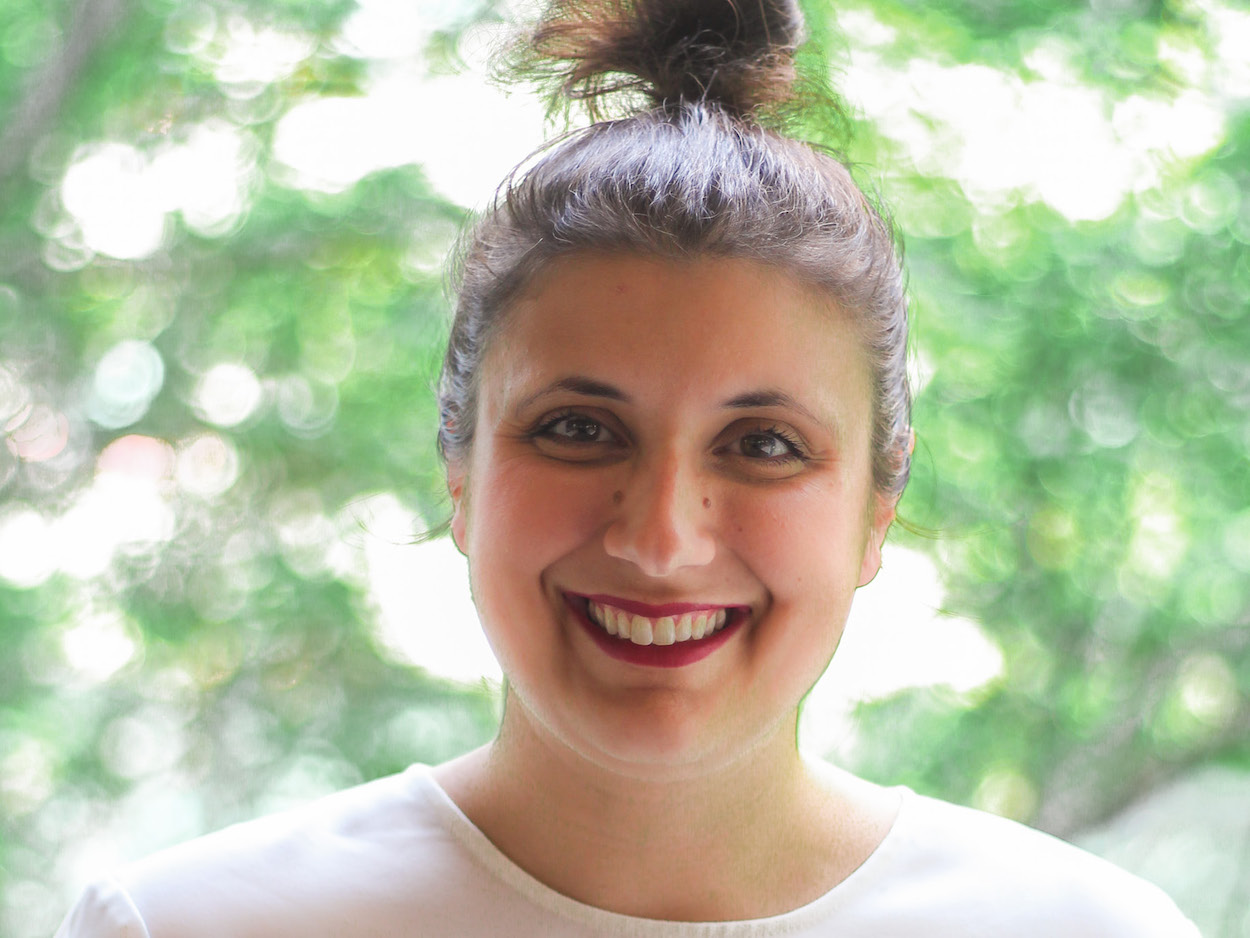
Director of Academic Planning and Student Affairs, Marie Crosta (opens in new window)
Students appreciate being connected with an industry member and feel like they now have a point of contact in the professional space that can give them insight into that world
Crosta notes that being a Ryerson alumni isn’t a requirement to participate as a mentor; industry professionals who are not Ryerson alumni but who are interested in giving back and connecting with a student are also welcome.
Gaining insight into the professional world via mentorship
The program runs for eight months starting in October and ending in May. “We asked students and mentors to commit to connecting for two or more hours a month depending on their availability” says Crosta. Due to the pandemic, the matched pair connected online only, which Crosta notes had the added benefit of securing mentors from abroad, expanding the program’s reach and network.
Being able to adapt to new situations, especially when you’re starting out early in your career, is key
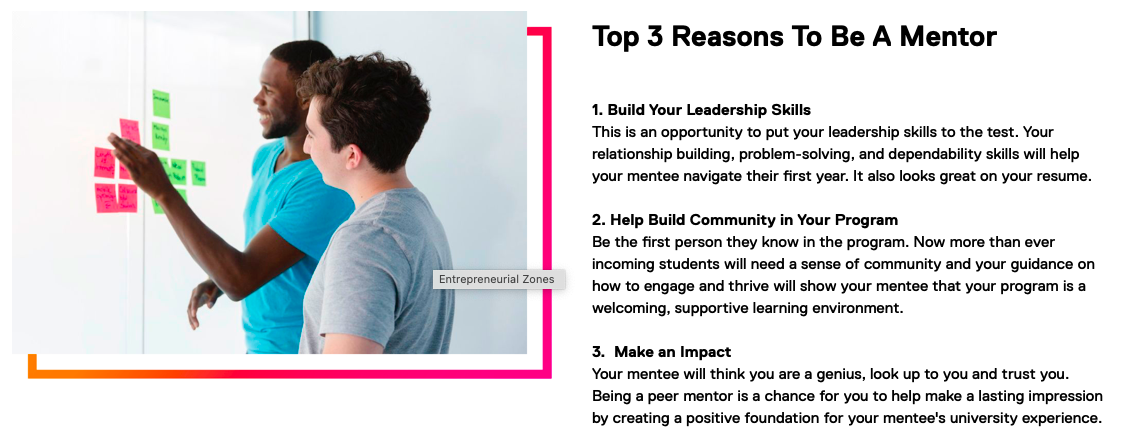
Reasons to find a mentor taken from The Creative School’s website
Crosta says the feedback from students has been wonderful. “Students appreciate being connected with an industry member and feel like they now have a point of contact in the professional space that can give them insight into that world, such as what to expect.” While contract lecturers and faculty members are also well connected in the creative industries, Crosta understands the importance of providing students with an external contact who isn’t tied to the school.
The feedback from mentors has been equally positive. The program provides these working professionals with student demographic details and skill-sets which they can then utilize in their industries. They are also looking for fresh talent, says Crosta. “The program acts as an introduction to a person they may be able to give an opportunity to in the future, so it definitely benefits both sides,” she says.
Grassi found the opportunity to share his professional insight with Duncan extremely valuable. “The industry is tricky since there’s no real standard across the board –— every room you’re in, every show you work on, and every script you write will be different. Being able to adapt to new situations, especially when you’re starting out early in your career, is key. What you learn in school versus what you learn in the world is drastically different” he says. “School protects you and your creative light and when you go out there, you hopefully find ways to foster that and make it soar rather than extinguish it.”
Mentors can observe strengths in students and suggest paths based on their skills. Sometimes it may be roles they never even knew existed
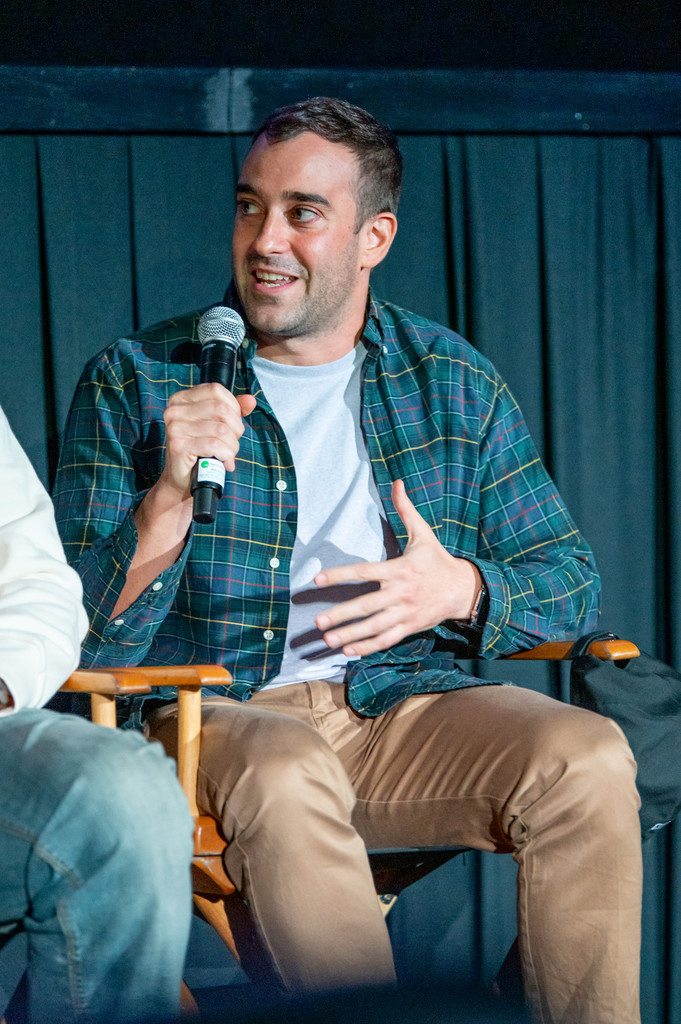
Michael Grassi, Riverdale writer and showrunner for Katy Keene
There is a coaching element to the partnership that Crosta notes is very beneficial. “Mentors can observe strengths in students and suggest paths based on their skills. Sometimes it may be roles they never even knew existed,” she says. “Students often graduate with this idea that they’re going to be this one thing and look for a very linear path to the goal when really, their path is going to be curvy and jagged. They may not even realize the different steps it takes to become a director, for example.”
Paving the way for successful future creative careers
Grassi wishes this type of program was in place during his time as an RTA Media student. “To have been able to connect with a working professional in the industry on such a consistent basis would have been a great peek behind the curtain of what’s to come,” he says. “I felt like I was hit with so many surprises early on in my career about what a room actually is, what being a writer actually means, and what the day-to-day looks like.”
To partner with a budding writer was a very grounding experience for Grassi. “It’s always so good to remember what it's like to be starting off in this industry. It helps remind you of why you got into it in the first place,” he says. “It’s important to have people who have gone through it, or are going through it, or are about to go through it that you can reach out to and commiserate with. Whatever level someone is in the industry, it's always nice to have a community. I love writers, and I love talking to writers. So speaking to writers, at whatever level they might be, is a pleasure.”
According to Grassi, mentorship is an excellent first step in paving the way for a successful career in the creative industries. “I would then recommend students continue to build relationships with people in the business, whether they’re doing exactly what you want to do or something adjacent. Work towards having as many of these relationships as you can and foster them in genuine ways. These people will come back to you in ways you don’t expect.”
To learn more about the mentorship program, contact Marie Crosta (opens in new window) and visit the mentorship website (opens in new window) .

The Creative School at Ryerson University
The Creative School is a dynamic faculty that is making a difference in new, unexplored ways. Made up of Canada’s top professional schools and transdisciplinary hubs in media, communication, design and cultural industries, The Creative School offers students an unparalleled global experience in the heart of downtown Toronto.